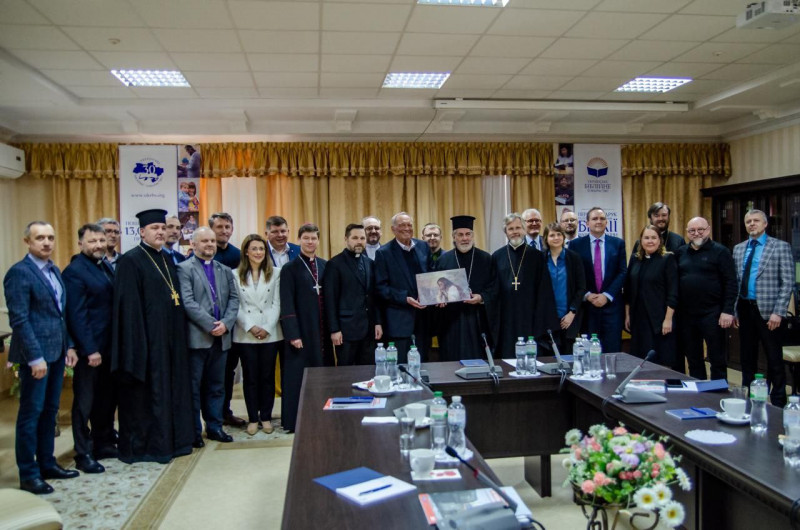
Photo: UCCRO
Press Release No: 06/24
12 April 2024
Brussels
The Conference of European Churches (CEC) delegation, during its visit to Ukraine, met with church leaders and government officials, offering solidarity as well as strengthening relations and dialogue. Since the Russian invasion of Ukraine in 2022, CEC has prioritised peacebuilding in the war-torn country.
The delegation, led by CEC President Archbishop Nikitas of Thyateira and Great Britain, held several meetings in Berehove, Lviv, and Kyiv from 8-10 April.
“We are here to testify that our Ukrainian brothers and sisters are not abandoned and not forgotten. We are here with you and we are close,” said Archbishop Nikitas.
“People all over the world must know that Ukraine is not part of the Russian world. The sovereignty and integrity of Ukraine’s borders must be respected.”
“We are deeply committed to just peace in Ukraine, as demonstrated by CEC initiative Pathways to Peace, a coordinated response of the European churches to the war in Ukraine,” he said.
In Lviv, the delegation visited the Ukrainian Catholic University (UCU), where they were welcomed by Rector Dr Taras Dobko, and had a special session with Prof. Yuriy Pidlisny, Head of the Ethics, Politics and Economics programme. Rev. Dr Roman Fihas, Director of the Institute of Ecumenical Studies of the UCU, and other staff members introduced the delegation to the Institute’s programmes, including its ongoing peacebuilding initiatives, and discussed possibilities of cooperation.
In Kyiv, the CEC delegation was received by the State Service of Ukraine for Ethnic Affairs and Freedom of Conscience (DESS). First deputy Head of DESS, Mr Viktor Voynalovych, stressed the importance of churches in unifying the people of Ukraine, and affirmed ecumenical cooperation. He thanked CEC for its clear and consistent position in condemning Russian aggression and encouraging support for Ukraine.

The delegation also met with members of the Ukrainian Council of Churches and Religious Organizations (UCCRO). The discussion addressed the impact of war on people, and the fatigue it triggers every day. It was stressed that the harsh reality of the war on Ukraine should not be forgotten, and the international community must continue to support Ukraine. Questions concerning establishing a just and lasting peace as well as freedom of religion were also discussed.
“We must keep the hope alive,” said Rev. Igor Bandura from the Baptist Church in Ukraine, a Member Church of UCCRO. “In our differences and diversity, the prophetic voice of the Church must speak the truth. It should not be afraid to speak against evil. With truth and justice, we will win over evil.”
In Kyiv, the delegation met with the Chancellor of Kyiv Metropolitanate, Archbishop Agapit of Vyshgorod from the Orthodox Church of Ukraine (OCU), a Member Church of CEC. He thanked the delegates for their courage to visit Ukraine during a full-scale Russian attack and conveyed greetings from His Beatitude Metropolitan Epiphany. He assured the delegates about the openness of the OCU to ecumenical dialogue.
The OCU representatives shared concern over the stance of Patriarch Kirill of the Russian Orthodox Church that claims the war to be of “holy status”. They condemned instrumentalisation of religion, and urged the European churches to publicly denounce this phenomenon.
The delegation met with His Beatitude Sviatoslav Shevchuck, Major Archbishop of Kyiv-Halych, Head of the Ukrainian Greek Catholic Church. He called the ecumenical and inter-religious relations a pastoral priority, and religious peace a cornerstone of Ukraine’s security. The weapozination of religion in the form of the Russian world ideology was also discussed, as well as cooperation with CEC.

H.E. Metropolitan Augustine of Bila Tserkva and Bohuslav of the Ukrainian Orthodox Church (UOC) welcomed the delegation at the premises of the Kyiv Theological Academy. Discussions focused on the UOC’s condemnation of the war, religious and ecumenical landscape of Ukraine, and the freedom of religion.
The CEC delegation also met with local theologians and other academics from various church backgrounds, who work on peace and dialogue initiatives on the ground.
The delegation included CEC Governing Board members Dr Charles Reed from the Church of England and Ms Maria Mountraki from the Orthodox Church of Finland; Pathways to Peace Steering Group members Rev. Riika Porkola from the Evangelical Lutheran Church of Finland, Dr Jonas Jørgensen from the Evangelical Lutheran Church in Denmark and Prof. Andrii Smyrnov from OCU. Among CEC staff was General Secretary-elect Rev. Frank-Dieter Fischbach and Ms Katerina Pekridou, CEC Programme Officer for Theology and Studies and coordinator of the Pathways to Peace initiative.
CEC is a fellowship of 114 churches from Orthodox, Protestant and Anglican traditions from across Europe and, together with its ecumenical partners, represents over 380 million European citizens.
Learn more about Pathways to Peace
For more information or an interview, please contact:
Naveen Qayyum
Communication Officer
Conference of European Churches
Rue Joseph II, 174 B-1000 Brussels
Tel. +32 486 75 82 36
E-mail: naveen@cec-kek.be
Website: www.ceceurope.org
Facebook: www.facebook.com/ceceurope
Twitter: @ceceurope
YouTube: Conference of European Churches
Subscribe to CEC news